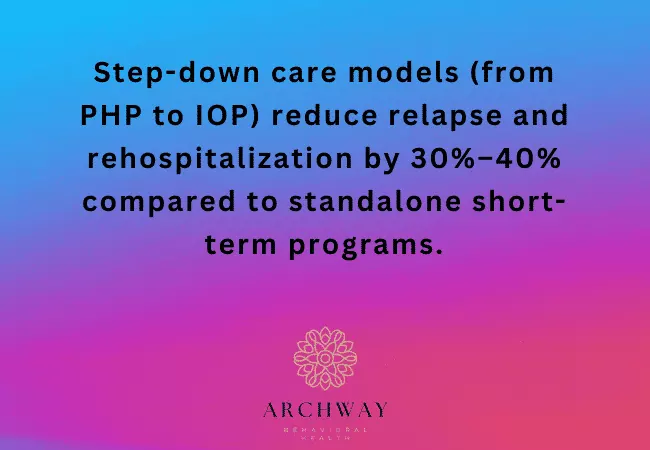Making the decision to seek mental health treatment is a powerful step toward healing—but knowing which level of care is right for you can be overwhelming. For many, the choice comes down to two core options: a Partial Hospitalization Program (PHP) or an Intensive Outpatient Program (IOP).
At Archway Behavioral Health, a leading mental health treatment center in Florida, we understand that no two people experience mental illness in the same way. That’s why we offer both PHP and IOP as part of our continuum of care, alongside evidence-based services like Cognitive Behavioral Therapy (CBT) and Dialectical Behavior Therapy (DBT). Our mission is to guide you toward the program that meets your specific needs—whether you’re navigating anxiety, depression, trauma, or emotional dysregulation.
This blog will help you understand the key differences between PHP and IOP, who each program is best suited for, and what to expect as you begin your recovery journey.
Understanding the Levels of Care in Mental Health Treatment
Mental health disorders—like major depressive disorder, generalized anxiety, panic disorder, and PTSD—often require more than traditional weekly therapy sessions. Programs like PHP and IOP provide structured, supportive environments for individuals who need consistent therapeutic care while still living at home or in a sober living environment.
Choosing the correct level of care helps ensure:
- Stabilization of acute symptoms
- Improved emotional regulation and functioning
- Skill-building for daily life and long-term recovery
- Support in a safe, non-judgmental environment
At Archway Behavioral Health, we help clients across Florida move through their recovery at their own pace through personalized mental health treatment services rooted in evidence and compassion.
What Is a Partial Hospitalization Program (PHP)?
A Partial Hospitalization Program (PHP) is a highly structured day treatment option for individuals who require intensive therapy and psychiatric support, but who are stable enough to return home each evening.
Who Is PHP Designed For?
- Individuals recently discharged from inpatient hospitalization
- People with moderate to severe symptoms of depression or anxiety
- Those who are struggling to function in daily life and need more than outpatient therapy
What You Can Expect in PHP:
- 5–6 hours of structured programming per day, 5 days a week
- Daily group therapy led by licensed professionals
- Weekly individual therapy with a primary clinician
- Psychiatric evaluations and medication management
- Holistic practices such as mindfulness, journaling, and stress management
- Support with relapse prevention, family dynamics, and life planning
- Access to our Anxiety Treatment Program Florida and Depression Treatment Program Florida
PHP at Archway offers the structure and clinical depth needed to achieve meaningful progress—especially for individuals facing emotional or psychological crisis.
What Is an Intensive Outpatient Program (IOP)?
An Intensive Outpatient Program (IOP) offers therapeutic support at a lower intensity than PHP. IOP allows individuals to maintain more of their daily routines, including work, school, and family responsibilities.
Who Is IOP Designed For?
- Clients stepping down from PHP or residential care
- Individuals with mild to moderate symptoms who still need consistent support
- People who want structure and accountability while maintaining a flexible schedule
What You Can Expect in IOP:
- 3–4 hours of therapy per day, 3–5 days a week
- Weekly individual therapy sessions
- Evidence-based group therapy focused on communication, coping skills, and emotional regulation
- Ongoing psychiatric and medication monitoring
- Life skills training, relapse prevention, and mindfulness
- Optional involvement in our Dialectical Behavior Therapy Florida and Cognitive Behavioral Therapy Florida tracks
IOP supports continued healing while promoting autonomy, making it an ideal option for those in transition or who are managing long-term recovery.
Core Therapies Used in Both PHP and IOP
At Archway, both programs include evidence-based therapeutic modalities that help individuals manage symptoms, build emotional resilience, and develop lifelong coping tools.
Cognitive Behavioral Therapy (CBT)
CBT is central to both programs and focuses on:
- Identifying and restructuring negative thought patterns
- Managing anxiety and depression symptoms
- Building practical strategies to cope with stress and triggers
Dialectical Behavior Therapy (DBT)
DBT is especially helpful for individuals with:
- Intense mood swings or impulsive behaviors
- Self-harm or suicidal ideation
- Difficulty maintaining relationships
DBT teaches skills in mindfulness, distress tolerance, emotion regulation, and interpersonal effectiveness.
Both therapy types are available in group and individual formats within PHP and IOP.
Real-Life Scenarios: When PHP or IOP Makes Sense
To better understand when each level of care might be appropriate, let’s walk through a few real-life examples.
Scenario 1: Severe Depression and Isolation
Maria, a 29-year-old graphic designer, has been experiencing severe depressive episodes. She’s been unable to work, spending most days in bed, and has recently had thoughts of self-harm. She’s tried weekly therapy, but her symptoms have worsened.
Best Fit: PHP
Maria would benefit from daily support, medication management, and structured group and individual therapy to help stabilize her symptoms.
Scenario 2: Anxiety and Work-Life Imbalance
James, a 36-year-old teacher, has been battling anxiety and panic attacks. While still working, he’s starting to avoid social events and struggles to sleep. He needs help, but can’t leave his job.
Best Fit: IOP
James can attend IOP in the evenings, learning skills to manage anxiety while staying active in his career and home life.
Scenario 3: Transitioning from Inpatient Care
Taylor, a 22-year-old college student, was recently hospitalized for suicidal ideation. She’s stabilized but isn’t ready to jump back into daily life without support.
Best Fit: Step-down from PHP to IOP
Taylor can begin with PHP, then transition into IOP as her symptoms improve and she gains independence.
Key Differences Between PHP and IOP
| Feature | Partial Hospitalization Program (PHP) | Intensive Outpatient Program (IOP) |
|---|---|---|
| Intensity of Care | High (full-day treatment) | Moderate (part-day treatment) |
| Time Commitment | 5–6 hours/day, 5 days/week | 3–4 hours/day, 3–5 days/week |
| Therapeutic Services | Individual, group, psychiatric | Individual, group, psychiatric |
| Ideal for | Moderate to severe symptoms | Mild to moderate symptoms |
| Flexibility | Low (structured schedule) | High (balance with life) |
| Living Arrangements | Home or sober living | Home or sober living |
| Duration | Typically 2–6 weeks | Typically 4–12 weeks |
How to Choose the Right Program
Choosing the right level of care starts with a thorough assessment by a licensed mental health professional. At Archway Behavioral Health, we offer comprehensive evaluations to determine:
- Current symptom severity
- Risk factors or safety concerns
- Support system and living environment
- Previous treatment history
- Personal recovery goals
We tailor your treatment plan based on these factors and provide ongoing assessments to help you step up or down as needed.
Why Archway Behavioral Health Is the Right Choice
As a leading mental health treatment center in Florida, Archway offers:
- A full continuum of mental health treatment services in Florida, from PHP to outpatient therapy
- Specialized tracks including our Anxiety Treatment Program Florida and Depression Treatment Program Florida
- A compassionate, experienced clinical team
- A strong focus on evidence-based therapies like CBT and DBT
- A healing environment that values dignity, empowerment, and long-term success
We believe in meeting clients where they are—and helping them build the tools and confidence to move forward.
Conclusion
Deciding between PHP and IOP isn’t just about scheduling—it’s about getting the right kind of help at the right time. Whether you’re stepping down from inpatient care, navigating a new diagnosis, or simply feeling overwhelmed and unsure where to start, Archway Behavioral Health is here to guide you.
With personalized care, flexible options, and a team that truly cares, we’re committed to helping you build a life rooted in stability, hope, and purpose. Call us today at (888) 488-4103 to schedule a private consultation and find out if PHP or IOP is right for you. Healing starts here—and you don’t have to do it alone.
Frequently Asked Questions (FAQ)
What is the main difference between PHP and IOP?
A Partial Hospitalization Program (PHP) is more intensive, offering full-day treatment five days a week. An Intensive Outpatient Program (IOP) provides part-day care several times per week, allowing for more flexibility.
How do I know which program is right for me?
If your symptoms are severe and significantly affecting your daily life, PHP may be the right fit. If your symptoms are moderate and you can manage some daily responsibilities, IOP may offer the right balance of structure and flexibility. A clinical assessment at Archway Behavioral Health will help guide this decision.
Can I work or go to school while in PHP or IOP?
Most clients in IOP are able to work, go to school, or care for their families while attending treatment. PHP is more intensive and may require you to pause other responsibilities during the course of treatment.
Is medication included in PHP or IOP?
Yes. Both programs at Archway Behavioral Health include psychiatric care and medication management as part of our integrated treatment approach.
Do both programs use CBT and DBT?
Yes. We incorporate Cognitive Behavioral Therapy (CBT) and Dialectical Behavior Therapy (DBT) in both PHP and IOP. These therapies are proven to help individuals manage depression, anxiety, emotional regulation, and trauma-related disorders.
How long do PHP and IOP usually last?
- PHP typically lasts between 2–6 weeks, depending on progress.
- IOP can last 4–12 weeks or longer, based on individual needs and goals.
Can I transition from PHP to IOP?
Yes. Many clients begin in PHP and step down to IOP as their symptoms stabilize and they become more independent. This “step-down” model is a common and effective approach to long-term recovery.
What conditions are treated in PHP and IOP?
We treat a wide range of mental health conditions, including anxiety disorders, major depression, trauma/PTSD, bipolar disorder, and more. We also offer specialized programs like our Anxiety Treatment Program Florida and Depression Treatment Program Florida.



